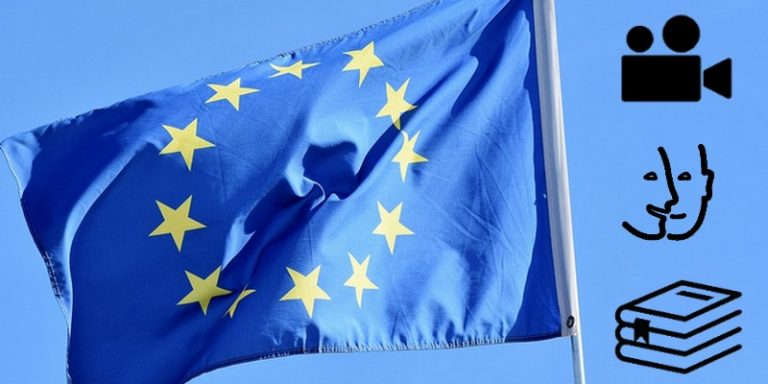
On May 19, the European Parliament adopted a resolution on artificial intelligence. In parallel to the announcement of the new regulation of the European Commission on AI, this text will intervene in the fields of education, culture and audiovisual. These three areas are very regularly subject to innovations where AI is exploited.
Outline of the general observations of the legislative resolution
In the first part of this resolution, the European Union underlines the strategic importance of AI and its associated technologies: by focusing these innovations on humans, based on ethics and human rights. The objective is for AI to become a real tool at the service of the European population, with an ethical dimension from its conception. The notions of training in AI-related issues for the main actors in the three fields as well as for the designers and developers of these systems are addressed in this text.
At the same time, the EU states that education, culture and the audiovisual sector are areas where the application of AI can be sensitive. in several respects: discrimination, privacy, freedom and EU values, intellectual property, etc. It calls on the Member States to take all these observations into account, especially the gender dimension, when developing national AI policies and legislation.
The EU recognises that AI can foster content creation in education, audiovisual or culture, but stresses the need to strike a balance between the development of AI systems in these three areas and the competitiveness of AI companies in these sectors.
It calls on the European Commission to include AI systems involving education as a high-risk system in the classification that will be used in the future European regulation on AI.
Artificial intelligence in education
In education, the European Union advocates, among other things:
- Enhancing digital competences and achieving a high level of media, digital and information literacy at EU level, as a prerequisite for the use of AI in education
- Making all these tools available to all social groups, and in particular to the disabled and disadvantaged. For the EU, AI in education offers a wealth of possibilities, perspectives and tools to create new quality learning methods.
- That EU citizens can become familiar with AI and gain at least a basic understanding of it. Projects promoting digital literacy and AI awareness campaigns are mentioned. Pupils, students, but also teachers are concerned so that they can adapt to the realities of education supported by AI.
- That the primary objective of the use of AI in education systems should be to achieve the most individualized education possible and thus promote personalized academic paths.
According to the EU, innovation is far too slow in the field of education. This observation was highlighted by the COVID-19 pandemic, which required schools to take drastic measures to enable distance learning.
Cultural heritage and artificial intelligence
In its text, the European Union also refers to culture. In France, it should be noted that this sector has been hard hit by the COVID-19 pandemic. Here are the recommendations of the European Parliament:
- All possibilities for improving and promoting access to culture should be exploited. The objective is to determine the most appropriate option while being consistent with the Marrakech Treaty. AI strategies can be a solution.
- Develop AI technologies to play an important role in the preservation, restoration, documentation, analysis, promotion and management of tangible and intangible cultural heritage. For example by analysing risks related to climate, natural disasters or armed conflicts.
- Developing AI technologies to increase the visibility of European cultural diversity. One of the projects in this direction would be the Odeuropa project: the olfactory encyclopaedia listing all the smells perceived in Europe throughout history.
- Identify good practices in the field of protection and accessibility of cultural heritage, especially for people with disabilities.
AI could also become a tool to promote cultural tourism and would be put to good use in the research sector to perform, for example, predictive data analysis.
Another part concerns the cultural and creative sectors and industries. The EU regrets that culture is not one of the priorities identified in the options and recommendations set out in the White Paper that served as the basis for the future EU regulation on AI. It recognises that AI has the potential to create jobs in this sector. AI would manifest itself, for example, in the automated production of text, video or music. The design of these tools must be done by experts mastering the subject, says the text.
Artificial intelligence in the audiovisual world
The European Union notes in its resolution that AI is already well established in this sector thanks to automatic decision-making algorithms, video platforms and streaming services, with targeted advertising for commercial purposes or personalised marketing. It advocates, among other things:
- That these systems can be easily explained and that they are non-discriminatory, strictly respecting fundamental rights and the RGPD.
- That what is illegal offline should also be illegal online. Some AI systems are already fighting against illegal content online.
- That specific and general monitoring of content of audiovisual media services is not possible according to the E-Commerce Directive
- That attention should be paid to the potential impact of algorithmic content recommendations on cultural and linguistic diversity. One can think in particular of the French cultural exception.
A section is also devoted to online disinformation and ultra-realistic video rigging. The EU recalls that with the emergence of new technologies, it is becoming increasingly difficult to detect false and manipulated content, which could undermine fundamental democratic values. It therefore calls on the European Commission to assess the impact of such practices in order to establish a legal framework so that creators are, for example, obliged to mention the non-original nature of the content.
Translated from Le parlement européen adopte une résolution autour de l’IA dans la culture, l’éducation et l’audiovisuel









